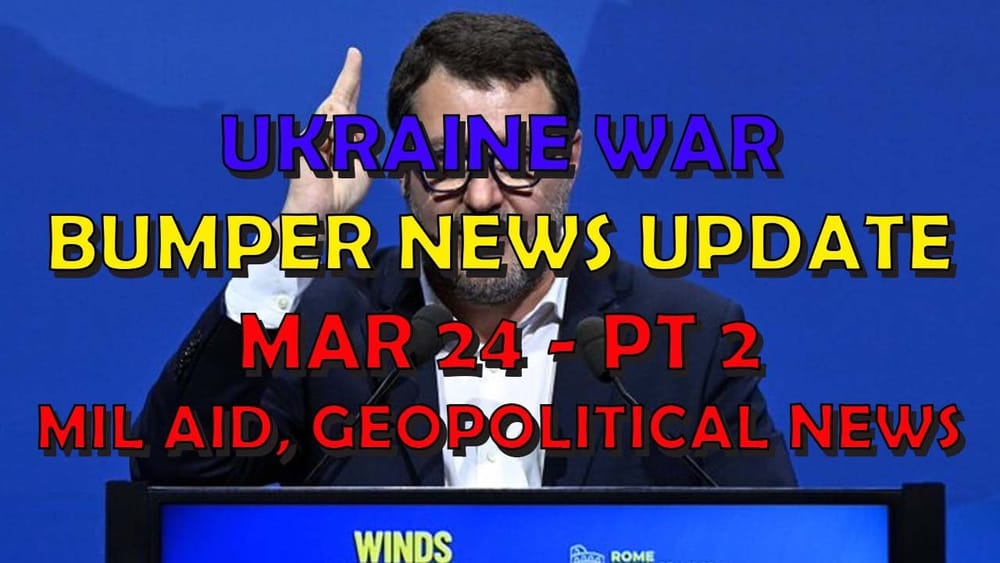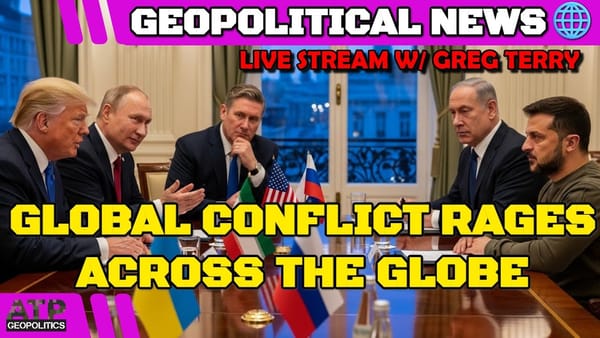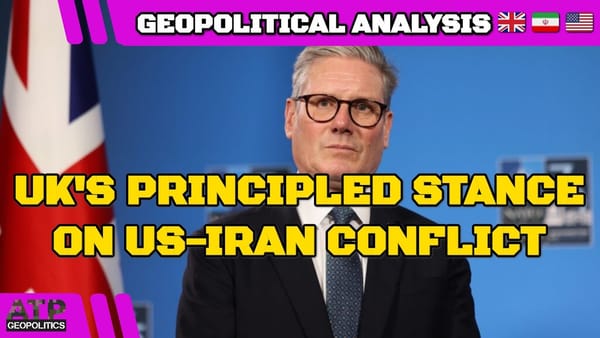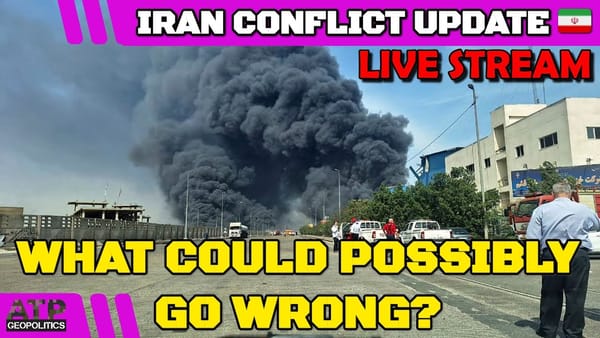Ukraine War Update NEWS: Military Aid & Geopolitical News
Table of Contents 📖
"I mean, it was a horrific, horrific event. But the reaction by Russia to this just shows that they have no credibility."
Hello Team
🎦 00:00-00:31⏩
Jonathan welcomes viewers to the second part of the March 24th Ukraine War News Update, explaining that the extensive events of the past 24 hours, including the Russian missile strike and events in Moscow, necessitated a two-part video. He plans to pick up where he left off, discussing the impact of the previous night's attacks on Ukraine.
Return to top⤴️
Impact of Russian Missile Strikes on Ukraine
🎦 00:31-02:17⏩
Jonathan reports on the aftermath of the Russian missile attacks on Ukraine, highlighting damage to Naftogaz energy facilities in western Ukraine, particularly around Lviv. He notes that these attacks primarily aim to disrupt Ukraine's military production, rather than directly harming civilians or energy infrastructure. The attacks involved cruise and Shahid drones, and potentially ballistic missiles, with reports suggesting the Russians employed "double-tap" tactics to target rescuers attending to the initial damage.
Return to top⤴️
Analysis of the Russian Presidential Election
🎦 02:18-03:45⏩
Jonathan analyses the recent Russian presidential election, calling it "the most rigged election in Russia's modern history". He cites evidence of ballot box stuffing and other irregularities, highlighting videos showing blatant manipulation. He emphasises the invalidation of key opposition candidates on spurious grounds, preventing genuine anti-war candidates from participating. This, combined with the reported 88% vote for Putin, demonstrates the absence of democratic processes and the heavily controlled nature of the election.
Return to top⤴️
Moscow Terror Attack: Unravelling the Narrative
🎦 03:45-14:12⏩
Jonathan dissects the terrorist attack on the Crocus City Hall in Moscow, navigating through initial speculation and Russian attempts to blame Ukraine and the US. While acknowledging ISIS's tendency to claim responsibility for events they were not involved in, he points to their formal admission, supported by released GoPro footage from the attackers, as compelling evidence of their involvement. He analyses the rationale behind ISIS targeting Moscow, citing Russia's strong stance against them in regions like Chechnya, Putin's claims of defeating them, and their embrace of traditional values – all factors that could motivate an ISIS attack. He critiques Russia's attempts to exploit the tragedy by falsely linking it to Ukraine and the US, further highlighting their lack of credibility. Jonathan also criticizes those, particularly Scott Ritter, who continue to push the Russian narrative despite mounting evidence. He calls out Ritter for his baseless claims implicating Ukraine and the CIA, labelling him a "useful idiot" for the Kremlin. He extends his criticism to Douglas MacGregor, who made equally unsubstantiated claims about the attackers. Jonathan condemns both individuals as "heinous" for spreading disinformation and furthering the Kremlin's agenda. He highlights the broader problem of Russian bot and troll farms manipulating online discourse by amplifying pro-Russian sentiment and suppressing opposing views.
Return to top⤴️
Impact of Sanctions on Russia's Energy Exports
🎦 14:12-18:35⏩
Jonathan discusses the increasing impact of sanctions on Russia's energy exports. He notes the growing number of Russian tankers, particularly those carrying diesel – a key export product – stranded at sea due to buyers' reluctance to purchase. He connects this to previous reports of Ukrainian attacks on Russian oil refineries, impacting their ability to produce refined products for the global market. While acknowledging the potential for rising global fuel prices and inflation as unintended consequences, Jonathan acknowledges the complex dilemma Ukraine faces in balancing its fight for survival with the potential geopolitical fallout of disrupting global energy supplies. He argues that aiding Trump's presidential bid by inadvertently causing an energy crisis could be detrimental to Ukraine in the long run, highlighting the delicate considerations at play. The discussion further explores the effectiveness of sanctions, highlighting the US's targeting of Sovcomflot (SCF), Russia's state-owned shipping company. This move has led to Indian refineries refusing tankers owned by SCF due to the risk of violating sanctions, further squeezing Russia's petroleum revenues. Jonathan cites experts who believe this could significantly tighten sanctions against Russia, even if it doesn't completely solve the problem of circumvention.
Return to top⤴️
US Politics and Aid to Ukraine
🎦 18:35-26:35⏩
Jonathan delves into the complexities of US politics and their impact on aid to Ukraine. He discusses Biden's signing of the 1.2 trillion dollar spending bill, praising the bipartisan effort to avert a government shutdown. He criticizes the actions of Marjorie Taylor Greene, who called for the removal of Mike Johnson, a key figure in negotiating the spending bill. Jonathan notes a potential shift in the narrative within pro-Republican media, with outlets like Fox News and Newsmax criticizing the MAGA approach. He speculates that this shift might indicate a growing understanding within the Republican party that their current approach is unsustainable and may harm their long-term goals. The conversation transitions to the allocation of 228 million dollars in military aid for Estonia, Lithuania, and Latvia as part of the Baltic Security Initiative. Jonathan analyses this move, drawing parallels with Ukraine's defensive preparations, and suggesting that the US might be bolstering the Baltic states' military infrastructure in anticipation of potential Russian aggression westward. He hypothesises that this could be a way for the US to indirectly support Ukraine by freeing up resources for the Baltic nations to provide direct aid. Jonathan expresses his concern about the delay in passing the Ukraine aid bill in the US Congress, highlighting the urgent need for action. He cites John Kirby's statement emphasising the human cost of the delay and the need for swift action in the face of Russia's ongoing aggression.
Return to top⤴️
Russia's Military Constraints and Geopolitical News
🎦 26:35-35:07⏩
Jonathan discusses reports of Russia postponing the delivery of two S-400 air defense systems to India, citing the need for these systems to protect their own assets from potential Ukrainian drone strikes. He links this to similar instances where Russia has diverted military equipment originally destined for export to the Ukrainian front, underscoring the strains on their military resources. Jonathan shifts his focus to European politics, analysing Emmanuel Macron's strong stance on Ukraine and his call for Europe to take charge of its defense. He examines potential American reactions to Macron's statements, ranging from resentment over perceived European independence to those who might agree with Trump's criticism of European defence spending. Jonathan criticises Matteo Salvini, Italy's deputy prime minister, for his pro-Russian stance and condemnation of Macron's statements. He highlights the hypocrisy of Salvini's position, arguing that Macron's actions are a necessary response to Russian aggression, the true threat to peace in Europe. He then discusses the upcoming European Parliament elections, arguing that while immigration will be a central theme, support for Russia will be a significant, albeit less visible factor. He expresses concern that right-wing parties, often carrying pro-Russian sentiments, may gain ground due to anxieties surrounding immigration, potentially hindering European support for Ukraine. Jonathan concludes this section by discussing Slovakia's political landscape, where pro-Russian Prime Minister Robert Fico and his coalition government face opposition from pro-EU figures like President Zuzana Čaputová and presidential candidate Ivan Korčok. He highlights the importance of the upcoming elections, urging Slovakian voters to reject corruption and Russian influence by supporting Korčok's pro-EU and pro-Ukraine stance.
Return to top⤴️
Wrap Up
🎦 35:07-40:22⏩
Jonathan acknowledges the volume of information covered and thanks his viewers for their patience. He emphasizes that understanding the wider geopolitical landscape, particularly the dynamics within European countries, is crucial to grasping the complexities of the Russia-Ukraine war. He reads a comment from a viewer, "Jompy", who expressed appreciation for Jonathan's dedication and the extensive work put into his videos, revealing that they spend an hour each day watching his content. Jonathan expresses his gratitude for the viewer's support and for their dedication to staying informed. He signs off, promising more content soon.
Return to top⤴️




